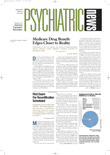APA's American Psychiatric Institute for Research and Education (APIRE) is piloting two new studies in real-world settings to evaluate the cost and quality of the treatments that psychiatrists use for depression and link those treatments with clinical outcomes in patients.
Beginning this month, APIRE reasearchers are surveying both psychiatrist members of APA's Practice Research Network (PRN) and a sample of their patients -the latter for the first time.
The PRN is a network of 726 practicing psychiatrists established in 1993. Half of the network members volunteer to participate in studies conducted by PRN staff, and half have been randomly sampled from a database of the AMA and asked to participate in the studies.
The researchers will collect longitudinal patient data within small samples initially to test the strength of survey methods before launching large-scale studies. Both studies employ strict informed-consent procedures for study participants and comply with federal privacy safeguards, according to APIRE researchers.
In the study, titled "Clinical Effectiveness of Treatments for Depression," researchers ask psychiatrists to complete an "elicitation of outcomes" form, in which they predict outcomes for a group of hypothetical patients with severe depression and certain demographic characteristics.
"It's important to know how psychiatrists rate the treatments available to treat depression, because they are the ones who decide which treatments the patients receive," co-principal investigator Maritza Rubio-Stipec, Ph.D., told
Psychiatric News.
The outcomes questions are modeled after those used by Richard Frank, Ph.D., a professor of health care economics at Harvard, according to Rubio-Stipec. Frank, using his Price Indexes for the Treatment of Depression, calculates indexes for the cost of outpatient treatment for an episode of major depression.
Frank bases his estimates on the expertise of a 10-member panel that reviews the literature on patients who have major depression and enter clinical trials and rates the treatments by predicting what outcomes they will bring about in patients.
"What we're trying to do," said co-principal investigator and APIRE Executive Director Darrel Regier, M.D., M.P.H., "is see whether outcomes in psychiatric settings reflect those projected by the expert panel."
Regier, who served as an expert on Frank's panel, said that if the PRN findings validate the panel's predictions about treatment outcomes, Frank would then be able to price outpatient treatments for depression more confidently.
Regier and Rubio-Stipec, as part of their study, will compare the predicted outcomes for hypothetical patients with actual outcomes provided by the patients, who complete a Hamilton-Depression scale (HAMD) at baseline and at 10 weeks.
Psychiatrists also provide information about the patient by completing baseline and follow-up surveys.
The follow-up information will enable the researchers, in the large-scale study, to compare the outcomes forecast by the psychiatrists at the outset of the study to actual patient outcomes.
"It is essential to obtain data on what types of outcomes are resulting from treatment strategies that are used each day in the practice of psychiatry," Regier added. "The general public doesn't have a sense of how good the treatments for depression are in comparison with treatments for other medical conditions."
Also, this month APIRE staff are launching the study "Outcomes of Psychiatric Treatment for Adolescent Depression" to learn more about the treatment strategies psychiatrists are using for adolescents with major depression and how well those treatments are working.
"What is unique about this study is that we are using multiple informants and gathering longitudinal data on the adolescents in our sample," said principal investigator William Narrow, M.D., director of APIRE's psychopathology research program.
Narrow explained that there is insufficient research on depressed children and adolescents, and all too often treatments for depression in the younger generations are based upon the findings from studies of adults with depression.
Narrow and Farifteh Duffy, Ph.D., a coprincipal investigator and APIRE research scientist, will gather information about adolescents with depression from three sources: psychiatrists, who provide information about patients' clinical characteristics, functioning level, and treatments; adolescent patients, who provide information about symptoms, feelings, and aspects of school and family life; and the adolescents' primary caregivers, who answer questions about their relationship with the patient and share observations about the patient's behavior and treatment compliance, for instance.
Psychiatrists complete a brief form at each patient visit to keep the researchers abreast of changes in the patient's treatment or clinical status between the baseline assessment and the final follow-up survey, two months later.
Psychiatrists, patients, and caregivers also complete follow-up surveys on topics ranging from clinical status and treatment compliance to satisfaction with treatment.
According to Duffy, the study "describes the treatments used in routine psychiatric practice for adolescents with depression and allows us to understand better the extent to which these treatments conform to existing treatment guidelines."
Narrow said the researchers will pay close attention to predictors of good outcomes in the adolescents, as well as "predictors of poor outcomes that may be modifiable -in this case, we would have a basis for an intervention-to enhance good outcomes or prevent poor ones."
More information about the APIRE studies is available by calling (800) 713-7123. ▪

